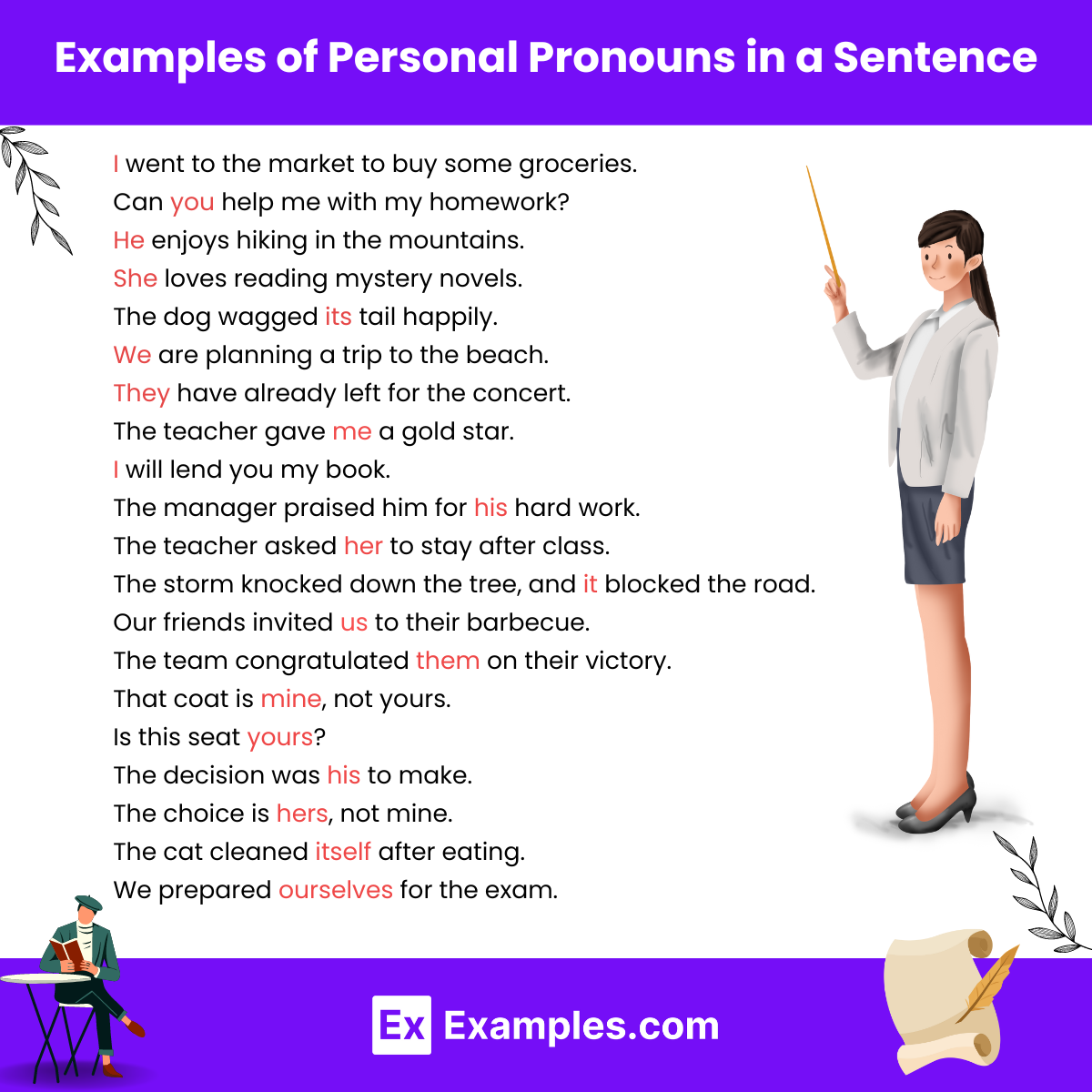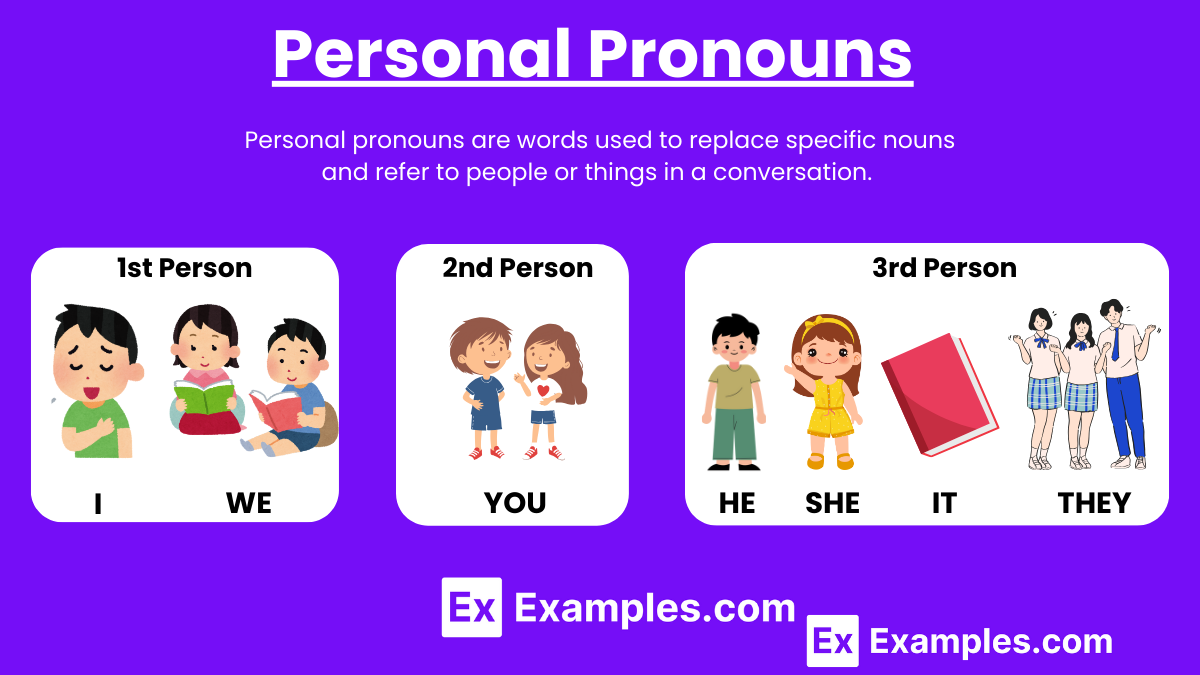75+ Personal Pronoun Examples
Personal pronouns replace specific nouns to avoid repetition and clarify sentences. These include words like “I,” “you,” “he,” “she,” “it,” “we,” and “they,” which vary by number, gender, and case. For example, instead of “Maria loves Maria’s cat,” we say, “She loves her cat.“ Personal pronouns make sentences fluid and clear. In parts of speech, they ensure pronoun-antecedent agreement by correctly referring to their antecedents (the words they replace).
What Are Personal Pronouns?
Personal pronouns are words used to replace specific nouns and refer to people or things in a conversation. They help avoid repetition and make sentences clearer and more concise. Personal pronouns include words like “I,” “you,” “he,” “she,” “it,” “we,” and “they,” and they change form depending on their role in a sentence (subjective, objective, or possessive).
Examples of Personal Pronouns
| Type | Singular Pronouns | Plural Pronouns |
|---|---|---|
| Subject Pronouns | I, You, He, She, It | We, You, They |
| Object Pronouns | Me, You, Him, Her, It | Us, You, Them |
| Possessive Pronouns | Mine, Yours, His, Hers, Its | Ours, Yours, Theirs |
| Reflexive Pronouns | Myself, Yourself, Himself, Herself, Itself | Ourselves, Yourselves, Themselves |
1. Subject Pronouns:
- I am going to the store.
- You are my best friend.
- He enjoys playing soccer.
- She is reading a book.
- It is raining outside.
- We will meet at noon.
- They are coming over for dinner.
2. Object Pronouns:
- The teacher gave me homework.
- I will call you later.
- She thanked him for his help.
- The dog followed her home.
- Please pass it to me.
- They invited us to their party.
- The coach congratulated them on their victory.
3. Possessive Pronouns:
- That book is mine.
- Is this pen yours?
- The jacket is his.
- The red car is hers.
- The cat licked its paw.
- The house at the corner is ours.
- The blue bike is theirs.
4. Reflexive Pronouns:
- I made this cake myself.
- You should treat yourself to a spa day.
- He hurt himself while playing.
- She prepared the meal herself.
- The machine shut itself down.
- We enjoyed ourselves at the concert.
- They organized the event themselves.
20 Examples of Personal Pronouns in a Sentence

- I went to the market to buy some groceries.
- Can you help me with my homework?
- He enjoys hiking in the mountains.
- She loves reading mystery novels.
- The dog wagged its tail happily.
- We are planning a trip to the beach.
- They have already left for the concert.
- The teacher gave me a gold star.
- I will lend you my book.
- The manager praised him for his hard work.
- The teacher asked her to stay after class.
- The storm knocked down the tree, and it blocked the road.
- Our friends invited us to their barbecue.
- The team congratulated them on their victory.
- That coat is mine, not yours.
- Is this seat yours?
- The decision was his to make.
- The choice is hers, not mine.
- The cat cleaned itself after eating.
- We prepared ourselves for the exam.
First Person Personal Pronouns Examples
- I am going to the store to buy some milk.
- We are planning a surprise party for our friend.
- The coach congratulated me after the game.
- The instructor gave us a challenging assignment.
- That book is mine.
- This project is ours to complete.
- I made this cake myself.
- We taught ourselves how to play the piano.
- I believe in taking regular breaks during study sessions.
- We enjoyed our vacation in the mountains.
Objective Personal Pronouns Examples
- The teacher gave me a compliment on my essay.
- She offered us some refreshments during the meeting.
- I will help you with your homework after dinner.
- The manager called you to discuss the project.
- They saw him at the park yesterday.
- She gave her a beautiful gift for her birthday.
- The dog followed it into the house.
- The coach praised them for their hard work.
- The company sent me an email about the job offer.
- We invited them to our anniversary celebration.
Subjective Personal Pronouns Examples
- I will help you with your homework after dinner.
- We invited them to our anniversary celebration.
- You are welcome to join us for dinner.
- He enjoys playing basketball on weekends.
- She gave her a beautiful gift for her birthday.
- It is a beautiful day today.
- They saw him at the park yesterday.
- You should come to the meeting tomorrow.
- He will be presenting his findings at the conference.
- She is studying for her exams.
Rules and Usage of Personal Pronouns
- Match Number and Gender
- Pronouns must agree with their antecedents.
- Example: Each student must bring his or her pencil.
- Avoid Ambiguity
- Ensure pronouns clearly refer to one specific noun.
- Example: John told Mike that John was late.
- Subjective Pronouns
- Use when the pronoun is the subject.
- Examples: I, you, he, she, it, we, they
- Example: They are playing.
- Objective Pronouns
- Use when the pronoun is the object.
- Examples: me, you, him, her, it, us, them
- Example: She called me.
- Possessive Pronouns
- Use to show ownership.
- Examples: mine, yours, his, hers, its, ours, theirs
- Example: The book is mine.
- Avoid Double Subjects
- Do not combine a noun and pronoun as subjects.
- Example: My brother is coming.
- Clear Antecedent
- Each pronoun must clearly refer to a specific noun.
- Example: Sarah was excited when she met Emily.
- “It” and “They” Usage
- “It” for singular non-humans; “they” for plurals.
- Example: The dog is barking. It is loud.
Comparing Subject and Object Pronouns
| Subject Pronouns | Object Pronouns |
|---|---|
| I | Me |
| You | You |
| He | Him |
| She | Her |
| It | It |
| We | Us |
| They | Them |
Subject Pronouns are used as the subject of a sentence, performing the action.
Object Pronouns receive the action in a sentence.
Examples:
- I (subject) gave her (object) a gift.
- They (subject) called us (object) yesterday.
Why are Pronouns Important?
Pronouns are essential in communication for several reasons:
- Clarity and Precision: Pronouns help avoid repetition of nouns, making sentences clearer and more concise.
- Gender Inclusivity: They allow individuals to express their gender identity, promoting respect and inclusivity.
- Efficiency in Language: Pronouns streamline sentences by replacing longer noun phrases, making language more efficient and easier to understand.
- Social Connection: Using the correct pronouns shows respect for others’ identities, fostering positive social interactions.
- Avoiding Ambiguity: Pronouns help specify who or what is being referred to, reducing confusion and enhancing communication accuracy.
Personal Pronoun Exercises
Exercise 1: Replacing Nouns with Pronouns
Replace the underlined nouns with the correct pronouns.
- John is reading a book.
- The cat is sleeping on the couch.
- Mary and I went to the park.
- The students are studying for the exam.
- The teacher gave the students homework.
Answers:
- He is reading a book.
- It is sleeping on the couch.
- We went to the park.
- They are studying for the exam.
- She gave them homework.
Exercise 2: Subject vs. Object Pronouns
Choose the correct pronoun to complete each sentence.
- (I/Me) went to the store.
- The dog followed (he/him) home.
- (We/Us) are going to the movies.
- Can you help (she/her) with the project?
- (They/Them) finished their homework early.
Answers:
- I went to the store.
- The dog followed him home.
- We are going to the movies.
- Can you help her with the project?
- They finished their homework early.
Exercise 3: Pronoun Agreement
Fill in the blanks with the appropriate pronouns to ensure pronoun agreement.
- Every student must bring ______ own pencil.
- If anyone calls, tell ______ I’ll call back.
- Neither of the boys has done ______ homework.
- Each of the girls has ______ own locker.
- The committee will announce ______ decision tomorrow.
Answers:
- Every student must bring his or her own pencil.
- If anyone calls, tell him or her I’ll call back.
- Neither of the boys has done his homework.
- Each of the girls has her own locker.
- The committee will announce its decision tomorrow.
FAQs
What is the difference between “I” and “me”?
“I” is a subject pronoun used as the subject. “Me” is an object pronoun used as the object.
When do you use “he” and “him”?
Use “he” as a subject pronoun and “him” as an object pronoun.
What are possessive pronouns?
Possessive pronouns show ownership. Examples include mine, yours, his, hers, its, ours, and theirs.
How do you use “we” and “us”?
“We” is used as a subject pronoun. “Us” is used as an object pronoun.
What is the role of “they” and “them”?
“They” is a subject pronoun, while “them” is an object pronoun.
Can “it” be used for people?
No, “it” is generally used for animals, objects, or ideas, not people.
How do personal pronouns agree with verbs?
Personal pronouns must agree in number (singular/plural) and person (first/second/third) with their verbs.
What is a reflexive pronoun?
A reflexive pronoun reflects back to the subject. Examples include myself, yourself, himself, herself, itself, ourselves, yourselves, and themselves.
How are personal pronouns used in comparisons?
Use subject pronouns in comparisons after “than” or “as.” Example: She is taller than I (am).
What are inclusive pronouns?
Inclusive pronouns are used to avoid gender-specific language. Examples include they/them/theirs for singular use.



